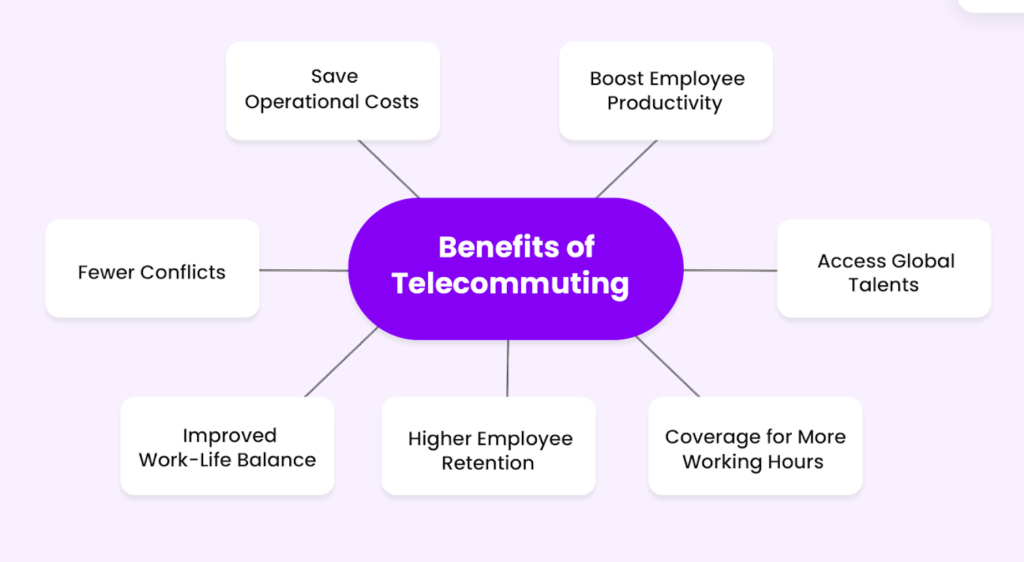Benefits of Telecommuting
In today’s digital age, telecommuting has emerged as a game-changer in the way we work. With the advancements in technology and the increasing need for work-life balance, more and more companies are embracing remote work options. In this article, we will explore the numerous benefits of telecommuting and how it can revolutionize the way we approach work.
Increased Flexibility and Work-Life Balance
One of the key advantages of telecommuting is the flexibility it offers. By allowing employees to work from anywhere, at any time, companies empower their workforce to achieve a better work-life balance. Gone are the days of long commutes and rigid schedules. Telecommuting allows individuals to structure their work around their personal commitments, resulting in increased job satisfaction and overall well-being.
Improved Productivity and Focus
Contrary to popular belief, remote work has been found to boost productivity levels. With fewer distractions and the ability to create a personalized work environment, employees often experience increased focus and efficiency. The absence of office interruptions and unnecessary meetings allows them to dedicate more time to their core tasks, resulting in higher-quality outputs and improved overall performance.
Cost Savings
Telecommuting not only benefits employees but also companies. By embracing remote work options, organizations can significantly reduce overhead costs associated with maintaining physical office spaces. Expenses related to utilities, office supplies, and commuting allowances can be minimized or eliminated altogether. This cost savings can be redirected towards other business initiatives, fostering growth and innovation.
Reduced Environmental Impact
Telecommuting plays a vital role in reducing our carbon footprint. With fewer employees commuting to the office, there is a significant decrease in greenhouse gas emissions and traffic congestion. This shift towards remote work contributes to a sustainable future by minimizing the environmental impact associated with daily commuting.
Enhanced Employee Engagement and Retention
Telecommuting has a positive impact on employee engagement and retention rates. By offering remote work options, companies attract and retain top talent who value flexibility and work-life balance. Employees who have the opportunity to work remotely are more likely to feel trusted and empowered, leading to increased job satisfaction and loyalty towards the organization.
Improved Health and Well-being
Remote work can have a profound impact on an individual’s health and well-being. By eliminating the stress and time-consuming nature of commuting, employees can allocate more time to self-care activities. This includes exercising regularly, preparing healthier meals, and spending quality time with loved ones. The ability to create a harmonious work-life integration positively affects mental health, reduces burnout, and enhances overall happiness.

Telecommuting offers a myriad of benefits that can revolutionize the way we work. From increased flexibility and work-life balance to improved productivity and reduced costs, the advantages are undeniable. By embracing remote work options, companies can unlock the potential of their workforce and create a culture of trust and empowerment. The future of work lies in telecommuting, and it is up to organizations to embrace this transformation for a more sustainable and fulfilling work environment.
FAQs
1. What is telecommuting?
Telecommuting refers to the practice of working remotely or from home using electronic communication technologies, such as computers and the internet.
2. What are the benefits of telecommuting?
Telecommuting offers several advantages, including:
- Increased flexibility in work hours
- Reduced commuting time and costs
- Improved work-life balance
- Higher productivity and efficiency
- Reduced stress and improved mental health
3. Can telecommuting save money?
Yes, telecommuting can help save money by eliminating expenses related to commuting, such as transportation costs, parking fees, and eating out during lunch breaks.
4. Does telecommuting improve work-life balance?
Yes, telecommuting allows individuals to have more control over their work schedules, enabling them to better balance their professional and personal lives.
5. How does telecommuting contribute to higher productivity?
Telecommuting eliminates distractions commonly found in traditional office environments, allowing employees to focus more on their tasks and complete them efficiently.
6. Can telecommuting reduce stress?
Yes, telecommuting can reduce stress by eliminating the daily commute, providing a more comfortable and familiar work environment, and allowing for better work-life integration.
7. Are there any environmental benefits to telecommuting?
Yes, telecommuting reduces carbon emissions associated with commuting, leading to a decrease in air pollution and a smaller carbon footprint.
8. Can telecommuting increase job satisfaction?
Telecommuting has been linked to higher job satisfaction due to the increased flexibility, autonomy, and reduced stress it offers to employees.
9. Does telecommuting affect team collaboration?
Telecommuting can be supported by various collaboration tools and technologies, enabling effective communication and collaboration among team members, regardless of their physical location.
10. Is telecommuting suitable for all types of jobs?
While telecommuting is more feasible for certain roles, advancements in technology have made remote work possible for a wide range of professions, including software development, customer service, marketing, and more.




